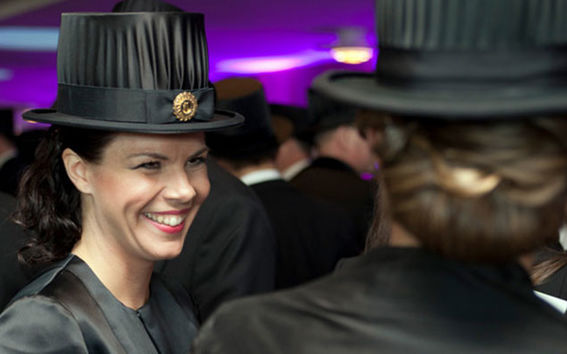Ceremonial conferment to celebrate 421 new doctors in the field of technology

The Aalto University schools of technology and the Department of Architecture will host a joint ceremonial conferment of doctoral degrees on 15 June 2018. The event is organised by the School of Engineering and it marks Aalto University’s fifth conferment in the field of technology.
You can follow the day event from 13:00 onwards via live stream at http://suite.icareus.com/web/bright/player/embed/webcast?eventId=9966137&playerId=9965692.
The most important part of the conferment day is the act of conferment, in which doctoral graduates are ceremonially introduced and given the insignia of their degree, the doctoral hat of technology. The emblem on the hat depicts the flame of knowledge and labour, a symbol for the work and achievements of the new doctors. In total, the ceremony will honour seven honorary doctors, 421 new doctors and 21 jubilee doctors.
Professor Kirsi Virrantaus from the Department of Built Environment will serve as conferrer, the first woman to serve in the role in Otaniemi conferment history.
’It is a special pleasure and honour to serve as conferrer, seeing as the number of female doctoral graduates continues to climb year over year. The first time a woman completed a doctorate in technology was in 1945, but even by the dawn of the 90s, women accounted for only a handful of degrees per year. In Aalto University today, one in four doctoral graduates in the field of technology is a woman’, Virrantaus says.
Assistant Professors Jarkko Niiranen and Heidi Salonen from the Department of Civil Engineering will act as masters of ceremonies.
The conferment day’s programme begins at 10 o’clock with an ecumenical service in the Otaniemi Chapel. The ceremonial conferment of doctoral degrees will be held in the Kaleva hall of Dipoli, starting at 13.00. The ceremony is followed by the conferment dinner, ball and afterparty. Earlier in the week, conferment guests have participated in ballroom dance rehearsals: a polonaise, the Cicapo, the Mignon and the Grande Valse.
The conferment tradition in the field of technology is renewed as it is continued: this year, the ceremony is a part of the Ceremony Week of Aalto University, a celebration of every student who graduated from the university in the academic year 2017–2018.
Conferment day programme, Friday 15 June 2018
- Ecumenical service 10.00–11.00 at Otaniemi Chapel, Jämeräntaival 8, Otaniemi, Espoo
- Ceremonial conferment 13.00–16.00 in Kaleva hall in Dipoli, Otakaari 24, Otaniemi, Espoo
- Conferment dinner, ball and afterparty starting 19.00 in Dipoli
For more information, visit http://ceremonyweek.aalto.fi/en/tekniikan_promootio_2018/program2018/
Read more news

Your voice gives away valuable personal information, so how do you keep that data safe?
With speech technologies becoming increasingly common, researchers want to make sure we don’t give away more information than we mean to.
A new way to measure contagion: the gut bacterium behind blood poisoning can spread like influenza
Neither the antibiotic-resistant nor the highly virulent strains are the most transmissible.
Cross-sectoral working group: Competitiveness, security and green transition must be promoted as a whole
A cross-sectoral working group for universities, businesses and cities is proposing that Finland speed up its international competitiveness, national security and green transition as one entity. The group suggests that, for example, defence procurement could support solutions aimed at a carbon-neutral society.






